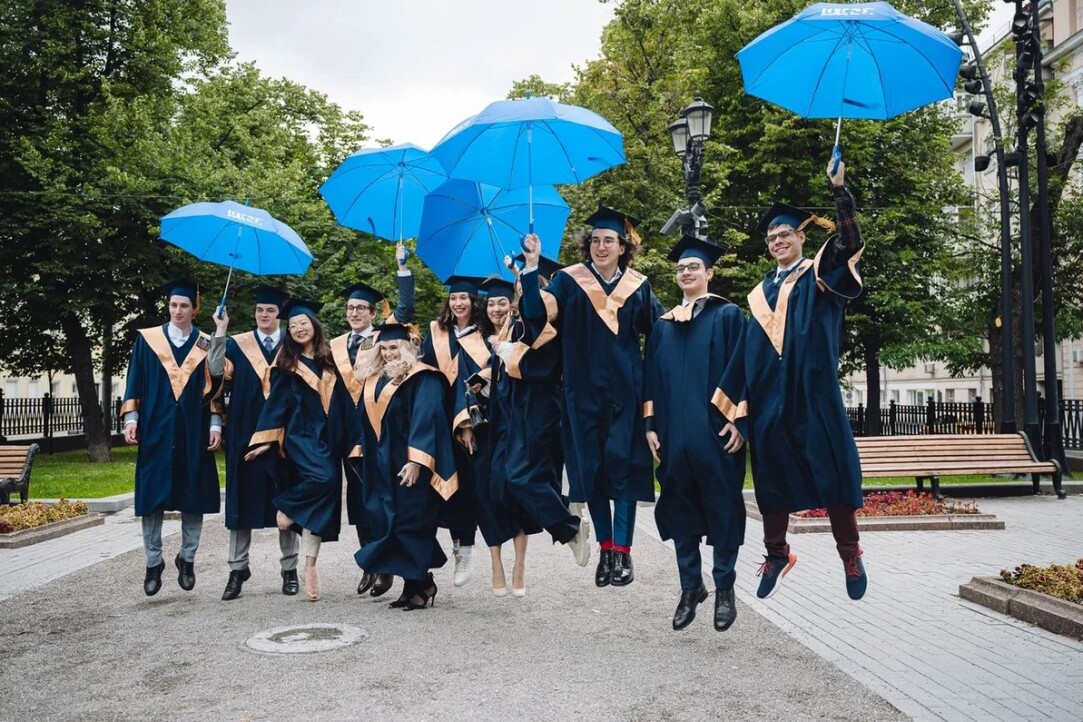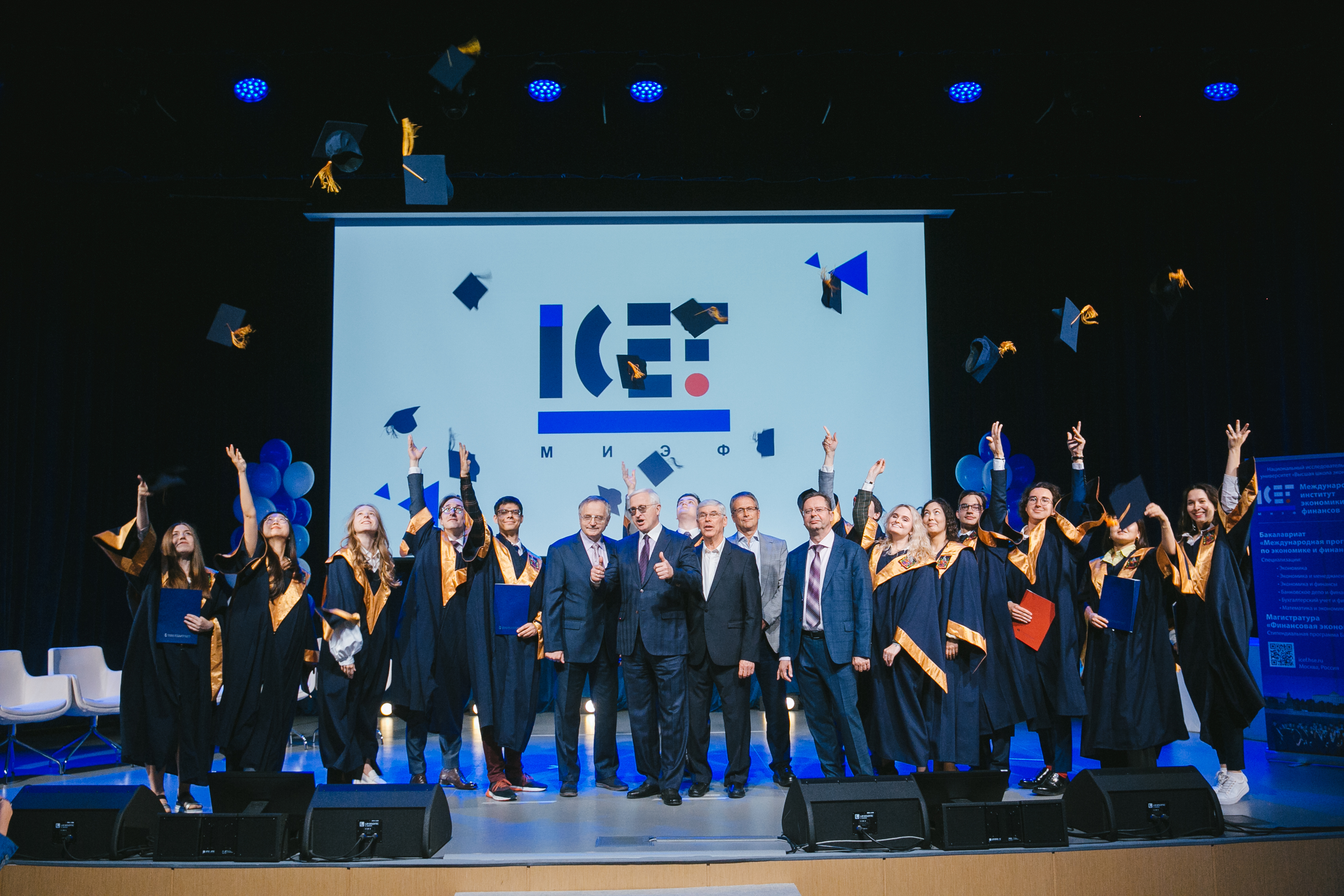ICEF MSc Programme in Financial Economics: Today and Tomorrow

The 2022/23 academic year has come to an end and we feel this is the perfect time to reflect on the current performance and future progress of our master’s programme. Here’s how ICEF Director Sergey Yakovlev, MSc Programme Academic Supervisor Maxim Nikitin, and Head of ICEF Career Services Victoria Pralich see its future.
Sergey Yakovlev, ICEF Director:
This year, ICEF Master’s Programme graduated its fifteenth class. The programme has been progressing successfully since 2007, when it was started in cooperation with the London School of Economics (LSE), and builds on the academic concept that brings it on a par with the master’s degrees of the world’s top universities. Speaking to its international recognition is the fact that it ranks consistently since 2019 among the Top 100 in QS Business Master’s in Finance Ranking, and remains the number one finance programme in the Russian Federation. ICEF master’s graduates continue to be the preferred candidates with many employers and post-graduate programmes.
My colleagues will tell you more.
ICEF MSc programme continues to evolve successfully, attracting academically bright undergraduates. What are its main advantages?
Maxim Nikitin, ICEF MSc Programme Academic Supervisor:
Our programme combines the best traditions of the Russian and the British academic cultures. Its principal advantage lies in the unique blend of fundamental knowledge and hands-on skills required in the field of economics and finance. Alongside core curriculum, we offer a set of electives that provide first-hand industry knowledge, data analysis skills and programming skills, which are taught in cooperation with Avito Analytics Academy and SBER-HSE Faculty of Computer Science joint department.
What forms the international component of the ICEF MSc programme?
Maxim Nikitin, ICEF MSc Programme Academic Supervisor:
The stake on international format has been the key feature of this programme since its start in 2007. All courses are delivered in English. The core and major-specific courses are taught by full-time academics with PhD degrees from the world’s leading universities – University of California, Berkeley, Northwestern University, London School of Economics (LSE), Caltech, London Business School, Toulouse School of Economics, among others. The students are free to create the learning paths that best fit their needs, and that includes academic mobility opportunities – one (second) year in a double-degree track with our overseas partners, or one exchange semester at any of HSE’s partner universities in 18 countries (including Germany, China, Brazil, Italy, Israel, and Turkey). The double-degree tracks and exchange opportunities are taken by the majority of our second-year students. We have five students completing their studies at LUISS University (Italy) in the summer of 2023, and our exchange student from LUISS Francesca Macchia has recently completed her programme with us. Provided that these students successfully defend their master’s theses, they will graduate with two diplomas, one from HSE and the other from LUISS. Another second-year student, Anna Baran, is currently on exchange at the Catholic University of Eichstätt-Ingolstadt (Germany). Exchange semesters are just one of the study abroad opportunities available to ICEF students. It is also possible do short-term internships. Four students are recently back from the Southwestern University of Finance and Economics (SWUFE) in Chengdu, China, where they joined the Summer School called Global Academy Summer Camp. Corporate Green Innovation and Sustainability that lasted from June 25 to July 8.
Who are your teachers?
Maxim Nikitin, ICEF MSc Programme Academic Supervisor:
The core and major-specific courses are taught by full-time academics with PhD degrees, and we are looking to hire more experts from the finance industry to teach the hands-on modules as part of the major-specific courses. The courses have a design where theoretical training (highly mathematical concepts and models) is followed by practicing experts explaining how these concepts and models should be applied in the workplace. In the fall of 2023 we’ll welcome Veronika Chistotinova from Raiffeisenbank to teach the units dedicated to derivatives. Mikhail Sukhanov from SBER will co-teach the course on risk management. Alexey Mikhailov from Gazprombank will be responsible for the commercial banking units and Dmitry Salamatov from Baring Vostok Capital Partners for the units dealing with private equity investment and venture capital financing. This year saw the start of the elective course led by Sovcombank. It teaches applied investment analysis, allowing the students to try on the role of an investment analyst and even get job offers from the bank if they show good progress.
Also, we are glad to welcome Alexander Usvitskiy, an internationally recruited academic who earned his bachelor’s from ICEF in 2013 and holds a PhD in Economics from the University of Florida (USA). Alexander will be teaching Microeconomics and Game Theory.
Your current students, are they mostly economics majors?
Maxim Nikitin, ICEF MSc Programme Academic Supervisor:
Yes. We have quite a number of students who earned their bachelor’s from the faculties of HSE – ICEF, Faculty of Economic Sciences, Programme in World Economy – as well as graduates of Moscow State University and Saint Petersburg State University. They are the academically-minded students who are looking to obtain solid grounding in their chosen field, rather than a wallpaper degree. But, non economics majors can apply as well. Some 15% of our students have background in mathematics, engineering or humanities. Humanities majors are eligible if they do extra math.
In 2023, we hosted our third Summer Bridge School in Financial Economics – an online series of short-term courses intended for the students recommended for admission to ICEF MSc Programme, as well as senior undergraduates who wish to apply after completing their bachelor’s studies. The participants are free to choose between attending all classes and doing particular modules in microeconomics, macroeconomics, econometrics, mathematical economics or finance, depending on their academic needs. All classes are taught by ICEF teachers. Over the three years of its existence, the Summer Bridge has seen a significant increase in the geography of its participants, 48% of whom are international students. Alongside its core task of preparing applicants for the master’s studies at ICEF, the Summer Bridge fulfills an important social mission: It contributes to increased availability of high-quality master’s education in economics and finance.

What industries have the class of 2023 found jobs in?
Victoria Pralich, Head of ICEF Career Services:
This year’s record of job placement inspires confidence in the bright career prospects of our graduates, as usual. More than 90% of the class of 2023 are already employed (mainly in Russia, but some have found jobs in Spain and Italy). Of them, more than half received job offers after completing their first year and more than a third are employed in finance sector – VTB, SBER, Raiffeisenbank, Russian Regional Development Bank, as well as Italy’s ID Finance Investments. One graduate landed a job in consulting at Kept (ex-KPMG). Two members of the class 2023 enrolled in HSE’s post-graduate programmes, and five are pursuing the double-degree track with LUISS with expected completion date in November. The rest of the grads have found jobs in industries as diverse as real economy and game development (Russia-based Sibur and MGVC), and insurance businesses in Spain.
Do you have many students who combine their studies with work?
Maxim Nikitin, ICEF MSc Programme Academic Supervisor:
We strongly discourage our students from starting a job while pursuing their master’s, especially in the first three semesters, when the concentration of core courses is the highest. At the same time, we advise students to join career events organized by ICEF Career Services and seek career advice from its team. At ICEF, master’s students can work as assistant lecturers or graders, and there are other schemes to ease your financial burden while pursuing your master’s.
Can you tell more about the financial support schemes available to applicants in 2023?
Maxim Nikitin, ICEF MSc Programme Academic Supervisor:
To begin with, the programme has 25 state-funded places for citizens of the Russian Federation and up to 10 free (quota) places for international students. Secondly, fee-paying students can expect a 50% or 85% discount, depending on their performance in the admission tests. As in previous years, to partially compensate nonresident students’ rental costs, we offer the accommodation bursaries. Also, there are performance-based scholarships from VTB, which are awarded on a competitive basis and can be granted to the student already at the stage of admission. There is no need to apply for the VTB scholarship separately, for our scholarship board will automatically consider every student for eligibility. More information about the available financial support schemes can be found on ICEF MSc Programme webpage.
If you planning to pursue a PhD at HSE after competing your master’s at ICEF, there’s a special track that offers a monthly scholarship of RUB 50,000.
How to enroll in ICEF MSc Programme in 2023?
Maxim Nikitin, ICEF MSc Programme Academic Supervisor:
The admission process involves a portfolio competition, which is the basic track with us. To qualify for the admission, you need to pass the in-house qualifying English test. The Admissions will then review your portfolio and invite you to do the online interview. Your portfolio score will be based also on the results of the interview. There is a special category of students whose portfolios automatically score 100 points. It includes recipients of early offers; top achievers in HSE Winter School of Economics for Sustainable Development 2023; winners and holders of first or second prize in Higher League Contest (2022, 2023) – Financial Economics track; winners and holders of top prizes from “I Am a Professional” contest (2022, 2023) in categories “Economics”, “Finance and Credit” and “Mathematics”. Applicants in this category do not need to do the interview. More information about the admission process and requirements can be found on ICEF MSc Programme webpage.
What is your advice to the prospective students of 2023?
Maxim Nikitin, ICEF MSc Programme Academic Supervisor:
Believe in yourself. There are good master’s programs in Moscow. If you are really focused on professional development, I don’t think you should get trouble getting into one of them.
